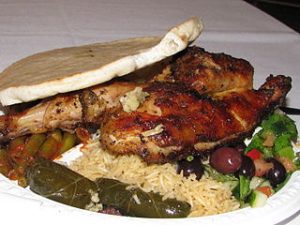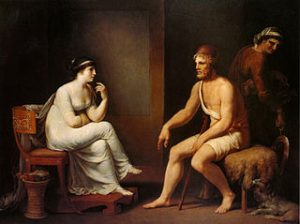
The question came up yesterday. If I could have dinner with any literary heroine, who would I invite? I felt like should choose Elizabeth Bennett, because her character resonates with modern readers. But then I thought, one has tea  with Elizabeth Bennett, not dinner. So, I set her to the side.
with Elizabeth Bennett, not dinner. So, I set her to the side.
Next I thought of Draupadi, the woman in the Mahabarata who simultaneously marries five brothers, but I’d be thinking of her household arrangements which seems a bit intrusive for dinner conversation.
And then it struck me. Though she flickers in the background of Homer’s Odyssey, Penelope, wife of Odysseus, is a most interesting character. Any woman with over a hundred suitors in her palace would have to be pretty quick-witted to remain faithful to a husband who left twenty years before. Now that would be an interesting dinner conversation.
Penelope’s parents were Icarius, King of Sparta, and Periboea, a Naiad-nymph. Icarius was a champion runner, and refused to let anyone marry his daughter unless the suitor could defeat him in a footrace. Naturally, Odysseus triumphed. Icarius offered Odysseus inducements if he would stay in Sparta, but Odysseus left for Ithaca with his bride. Icarius followed them, and begged his daughter to stay behind.
Odysseus offered his wife the choice of going him with him, or going back to Sparta with her father. 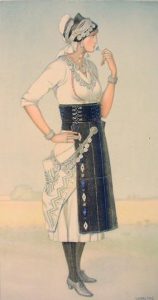 Penelope was as young as fourteen or as old as sixteen. She’d never been anywhere beyond Sparta’s palace. Her bridegroom was a handsome, strong young man. And what would become of her if she wasn’t married? Penelope never even voiced her choice, but modestly drew her veil over her face. A bride’s veiling indicated her separation from her prior status. She was the property of her husband. Nothing needed to be said, and she was smart enough to understand her husband’s offer wasn’t serious.
Penelope was as young as fourteen or as old as sixteen. She’d never been anywhere beyond Sparta’s palace. Her bridegroom was a handsome, strong young man. And what would become of her if she wasn’t married? Penelope never even voiced her choice, but modestly drew her veil over her face. A bride’s veiling indicated her separation from her prior status. She was the property of her husband. Nothing needed to be said, and she was smart enough to understand her husband’s offer wasn’t serious.
When Penelope arrived at her new home, she learned her husband was wealthy and that though his father Laertes was alive, Odysseus ruled Ithaca. She settled in, and produced a son and heir, Telemachus. So far, so average. But then Odysseus was called to fight in the Trojan War, and left his wife in charge. His son was an infant; his father unable. For twenty years, Penelope functionally ruled Ithaca without crossing behavioral bounds.
 After ten years, the Trojan War was over. Men returned home. But not Odysseus. He embarked on his ten year odyssey, including seven years spent with the goddess Calypso.
After ten years, the Trojan War was over. Men returned home. But not Odysseus. He embarked on his ten year odyssey, including seven years spent with the goddess Calypso.
Meanwhile, Penelope played hostess to a hundred suitors hoping to marry Odysseus’s widow and claim her husband’s wealth. As a chaste woman, Penelope couldn’t mingle with the men. As a hostess, she couldn’t throw them out, so she watched them consume her husband’s resources. Pressure mounted. Penelope must 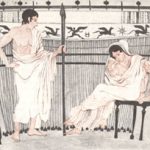 choose a husband. She agreed, but said she couldn’t until she honored her father-in-law by weaving his funeral shroud. She could take her time with this project, since Laertes was alive, and the men had no idea how long it takes to weave cloth. Chaste Penelope dutifully wove every day. Clever Penelope pulled out the threads every night. She got away with her ruse for three years, which is pretty good. The men didn’t catch on until one of Penelope’s maids betrayed her.
choose a husband. She agreed, but said she couldn’t until she honored her father-in-law by weaving his funeral shroud. She could take her time with this project, since Laertes was alive, and the men had no idea how long it takes to weave cloth. Chaste Penelope dutifully wove every day. Clever Penelope pulled out the threads every night. She got away with her ruse for three years, which is pretty good. The men didn’t catch on until one of Penelope’s maids betrayed her.
One day a beggar showed up. Guess who’s back? Penelope did, but her suitors didn’t. She started demanding gifts as evidence of their sincerity. The disguised Odysseus rejoiced at her cunning, “ luring gifts from her suitors now, enchanting their hearts with suave seductive words but all the while with something else in mind.”
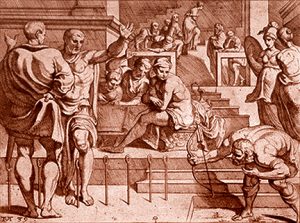 Then Penelope agreed to marry the man who could string the bow Odysseus received after his first boar hunt, and shoot an arrow through twelve axe heads. She set the stage for the beggar to compete. Just when things became interesting, Telemachus, her son, ordered Penelope upstairs because this was men’s business. Perhaps that’s just as well. Odysseus won the contest, revealed his identity, slaughtered the suitors and told his son to execute the serving maids.
Then Penelope agreed to marry the man who could string the bow Odysseus received after his first boar hunt, and shoot an arrow through twelve axe heads. She set the stage for the beggar to compete. Just when things became interesting, Telemachus, her son, ordered Penelope upstairs because this was men’s business. Perhaps that’s just as well. Odysseus won the contest, revealed his identity, slaughtered the suitors and told his son to execute the serving maids.
But Penelope had a final test for her husband. She told her servant to move the marriage bed. Whereupon, Odysseus
Blazed up in fury, lashing out at his loyal wife;
‘Woman, — your words, they cut me to the core!
Who could move my bed? Impossible task,”
[It seems he built one of the bedposts from a living olive tree.]
“Does the bed, my lady, still stand planted firm? —
I don’t know — or has someone chapped away
That olive-trunk and hauled our bedstead off?”
Shortly thereafter, Odysseus “wept as he held the wife he loved,” and she “embracing his neck would never for a moment let him go.”
To answer the original question, if I could have dinner with any fictional character, I would ask Penelope to join me. I’d like to hear her explain why she made the choices she did. For herself? To protect her son? Out of loyalty to a husband who went missing for ten years and suddenly showed up, only to challenge her faithfulness? And, most important, did she make the right choice?
Which fictional heroine would you invite for dinner? Leave your answer with the comments.
???
Odysseus and Penelope by Tischbein. Public Domain.
Tea for Two. Photo by Author.
Greek Macedonian Bride’s Dress. Public Domain.
Calypso by Jan Styka. Public Domain.
Weaving Frame. Изображение с греческой вазы. Пенелопа и Телемах у вертикального ткацкого станка. From Wikimedia Commons. US Public Domain.
Archery Challenge. Public Domain.
Greek Food by Rennett Stowe.
Homer. The Odyssey. Translated by Robert Fagles. Penguin. 1996.
Madeline Miller. “The Wily Wife.” The Telegraph. Apr. 8, 2018.
Emily Wilson. “A Translator’s Reckoning with the Women of the Odyssey.” The New Yorker. Dec. 8, 2017.

Sandra Wagner-Wright holds the doctoral degree in history and taught women’s and global history at the University of Hawai`i. Sandra travels for her research, most recently to Salem, Massachusetts, the setting of her new Salem Stories series. She also enjoys traveling for new experiences. Recent trips include Antarctica and a river cruise on the Rhine from Amsterdam to Basel.
Sandra particularly likes writing about strong women who make a difference. She lives in Hilo, Hawai`i with her family and writes a blog relating to history, travel, and the idiosyncrasies of life.

